The Manchester Museum
You Might Also Like:

Read More
c. 1400 BCE
The beginning of Celtic culture in the upper Danube region of central Europe.
c. 1200 BCE - c. 450 BCE
Widest date range accepted by scholars for the Hallstatt culture in central Europe.
c. 900 BCE
Celtic Migration begins in Europe with many Celts landing in Scotland.
c. 800 BCE - c. 600...
Read More
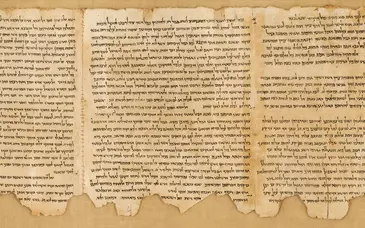
Read More
1. The Dead Sea Scrolls were discovered between 1947-1956 in 11 caves (5 by Beduin; 6 by archaeologists) on the upper northwest shore of the Dead Sea. The area is 13 miles east of Jerusalem, and is -1300 ft. below sea level (Jerusalem is +2400 ft. above sea level).2. Near the caves are the ancient r...
Read More
Conquest by Hyksos and Egyptian Expansion to Ramses II
Eventually, like previous dynasties, the Twelfth Dynasty fell. And the Thirteenth Dynasty, at Memphis, waned across its 150 years of rule and fell with what by now was an old phenomenon: invasion by a foreign army, around the year 1650 BCE.
The ...
Read More
Pompeii was a city built more than 2000 years ago which got covered in ash from when the Vesuvius erupted. The people died intoxicated by fumes coming from the eruption.
"To us at distance it was not clear which mountain was belching out the cloud, but it was later discovered to be Vesuvius. In form...
Read More
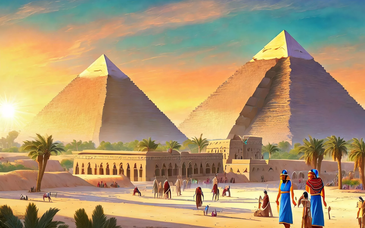
Read More
Welcome to the ideal place to start exploring the wonders of the Ancient Egypt. Find out all about this amazing culture, and learn about the gods they worshiped, the Pharaohs that ruled and the tombs and statues they left behind.
find out about Tutankhamun, Akhenaten and the other celebrities of t...
Read More
Ancient Egypt had its origin in the course of the Nile River. It reached three periods of great pharaonic splendor: the Ancient Kingdom, the Middle Kingdom and the New Kingdom.
Ancient Egypt map domain stretched from the delta of the Nile in the north, to Elephantine Island, where is the first catar...
Read More
Mummy and Coffin of Meresamun
Cartonnage, pigment, human remainsThird Intermediate Period, Dynasty 22, ca. 946-712 B.C.Purchased in Luxor, 1920OIM 10797
This colorful cartonnage mummy case, which still contains the mummy of an ancient Egyptian woman, is inscribed with the name Meresamun ("She lives ...
Read More
The Early Dynastic Period -0 : 1 : 2 :
The Old Kingdom -3 : 4 : 5 : 6 :
The First Intermediate Period -7+8 : 9+10 :
The Middle Kingdom -11 : 12 :
The Second Intermediate Period -13 : 14 : 15 : 16 : 17 :
The New Kingdom -18 : 19 : 20 :
The Third Intermediate Period -High Priests (Thebes) : 21 : 22 : ...
Read More
Interesting facts and information about the mummification process.
The mummy shown here dates from the Roman Period. It has a distinctive painting inlaid into the head part, and is intricately bandaged and studded. The feet are molded in gold painted plaster, which is typical of the period.
...
Read More
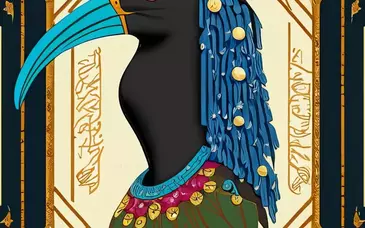
Read More
The god Thoth was worshiped in the form of an Ibis, and is often shown in human form with the unusual head of that bird.
Thoth was primarily thought to be the god of wisdom. He was patron of arts and science and also the patron god of scribes. He was the inventor of the words of god, or Hieroglyphs...
Read More
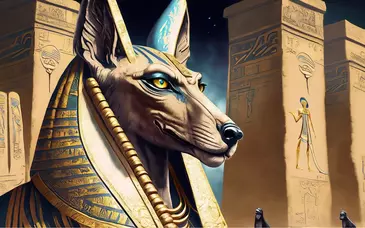
Read More
The Ancient Egyptians held a great reverence for the Jackal headed god Anubis, who oversaw the embalming and mummification process as well as escorting the deceased through the procedures for entering the underworld.When the person arrived for judgment, they would first declare their purity before...
Read More
Symbolism in Architecture
Mohammed Motlib
The Window of Appearance
The Temple Palace of Rameses III at Medinet Habu 1175 BC
The window, situated at the centre of the eastern face of this palace, has a set of stairs behind it descending into a columned hall. Rameses III would come through this hall a...
Read More
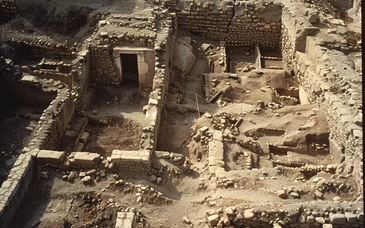
Read More
In the narrative of Acts leading up to Ephesus, Luke has shown what happens when Paul visits a town for a few weeks (e.g., Philippi or Thessalonica), or a period of a year and a half (i.e., Corinth). At this juncture, Luke seeks to demonstrate what happens when the apostle stays for a three-year dur...
Read More
Below are photographs and descriptions of buildings and places as they are today. Buildings that were constructed after Paul's time are still addressed, so keep in mind that Paul would not have seen such architectural structures as the Library of Celsus and the Temple of Hadrian. Click on an image b...
Read More
This section of the presentation includes an in-depth look at those panels of Acts that were outlined briefly in the introduction.
Transition, Including a Brief Visit to Ephesus (18:18-23)
18 After this Paul stayed many days longer, and then took leave of the brethren and sailed for Syria, and with...
Read More
Ephesus is a big deal for Luke. It is here that Paul is presented as being larger than life. Just as the events that led up to the Jersualem conference (Acts 15), the events in Paul's work led up to the highlight of his ministry: Ephesus.
To get a better grasp of the episodes connected with this cit...
Read More